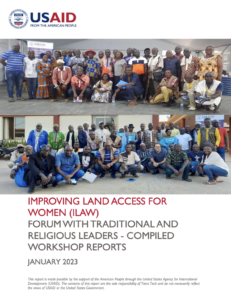 The goal of the Improving Land Access for Women (ILAW) Activity is to increase social cohesion, reduce land conflicts, and empower women to contribute to their communities economically by strengthening their legal access to land in the Northern and Western regions of Côte d’Ivoire (CDI). ILAW will achieve this goal through two performance objectives: Objective 1 – Empower communities in Northern and Western CDI through awareness raising, advocacy, and communication campaigns on land and women’s rights in Western and Northern CDI; and Objective 2 – Strengthen women’s access to legal and conflict mediation services in rural and urban areas to ensure their access to land in Northern and Western CDI.
The goal of the Improving Land Access for Women (ILAW) Activity is to increase social cohesion, reduce land conflicts, and empower women to contribute to their communities economically by strengthening their legal access to land in the Northern and Western regions of Côte d’Ivoire (CDI). ILAW will achieve this goal through two performance objectives: Objective 1 – Empower communities in Northern and Western CDI through awareness raising, advocacy, and communication campaigns on land and women’s rights in Western and Northern CDI; and Objective 2 – Strengthen women’s access to legal and conflict mediation services in rural and urban areas to ensure their access to land in Northern and Western CDI.
As part of its baseline Political Economy Analysis (PEA), ILAW identified traditional chiefs and religious leaders as key opinion leaders who should be engaged as part of the project’s Social and Behavior Change Plan (SBCP). As such ILAW organized between November 29 and December 2, 2022 two workshops targeting traditional chiefs and both Muslim and Christian religious leaders from the project’s 30 intervention villages and nearby towns. The two-day workshops aimed at creating a space to inform and gain buy-in for ILAW activities, inform these leaders of key parts of national laws that will be shared with communities as part of the mass communication campaign, and obtain feedback from traditional leaders on types of messages and targets that should be considered. The workshops also include a training component on land and gender and inheritance rights in Cote d’Ivoire.
The present workshop reports describe the proceedings and key outcomes of these activities. Some highlights include the following observations:
• As a whole traditional and religious leaders are supportive of the project’s objectives and activities, though remain skeptical about how much change in social norms is possible.
• Most of the traditional and religious leaders noted that they were influential but had limited power with respect to land decision-making as most land belongs to land-owning families.
• Very few participants had basic understanding of the marriage and inheritance laws, showing the importance of the upcoming campaigns. However, participants in the West had a relatively better understanding of the rural land law.
• Traditional leaders proposed several useful solutions to reconciling religious and traditional mores with the law. For example, one chief in the north suggested that men can do sacrificial rites on behalf of women so as not to violate animistic practices while extending access to women, and an imam noted that Islamic law foresees inheritance rights for women.
• Traditional and religious leaders are often involved in family conflict resolution. Many of these conflicts involve questions around inheritance in complex multi-partner relationships. As such they expressed interest in how the law deals with such situations including the order of priority among inheritors.
• Participants were very responsive to and engaged by the draft black-and-white illustrations used to convey messages and information. ILAW received useful feedback that led to changes in the illustrations, including small details like the types of crops depicted.
As a whole the leaders expressed appreciation for being included. ILAW took advantage of the gathering to remind them of the project’s objectives, activities to date and upcoming interventions including legal assistance and the awareness-raising campaign on the law. The workshops therefore succeeded in creating an environment of trust and buy-in for these activities which will be essential especially in case of difficulties or resistance in the coming months.

